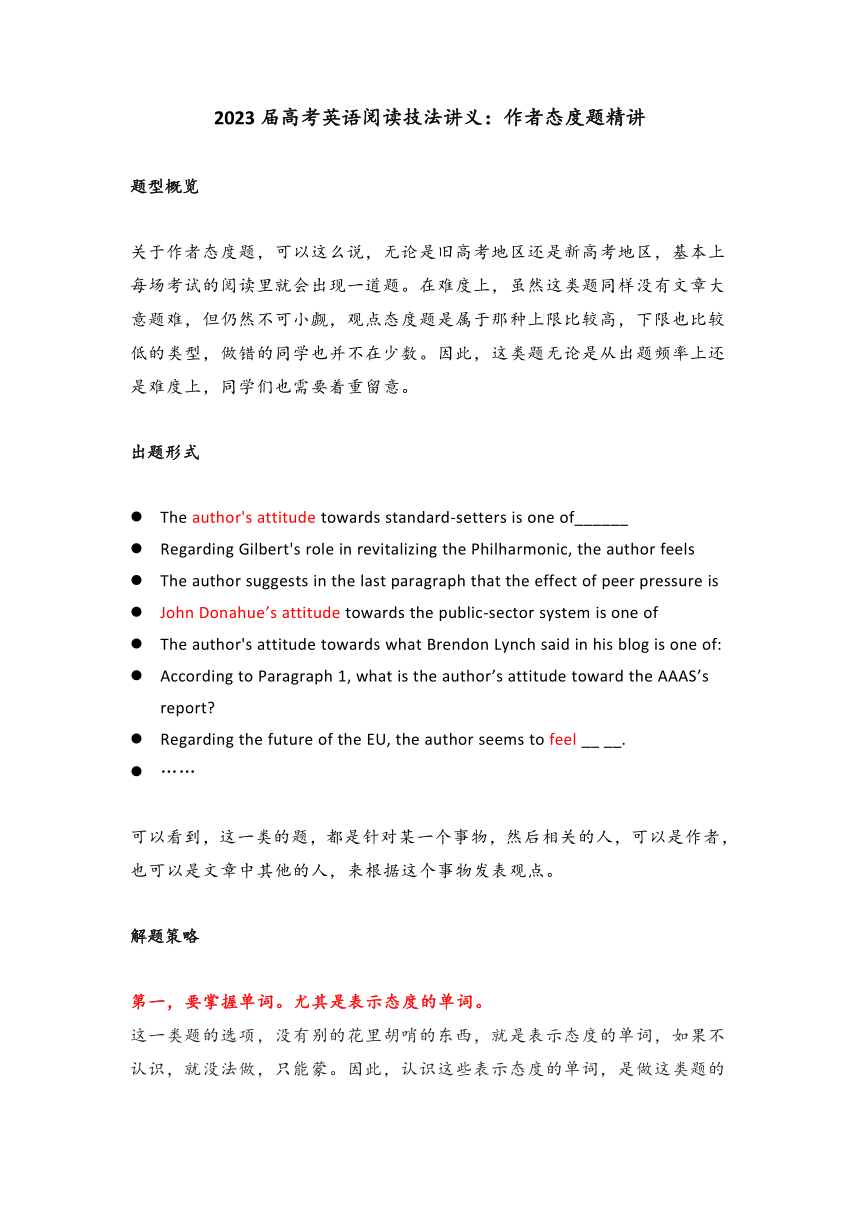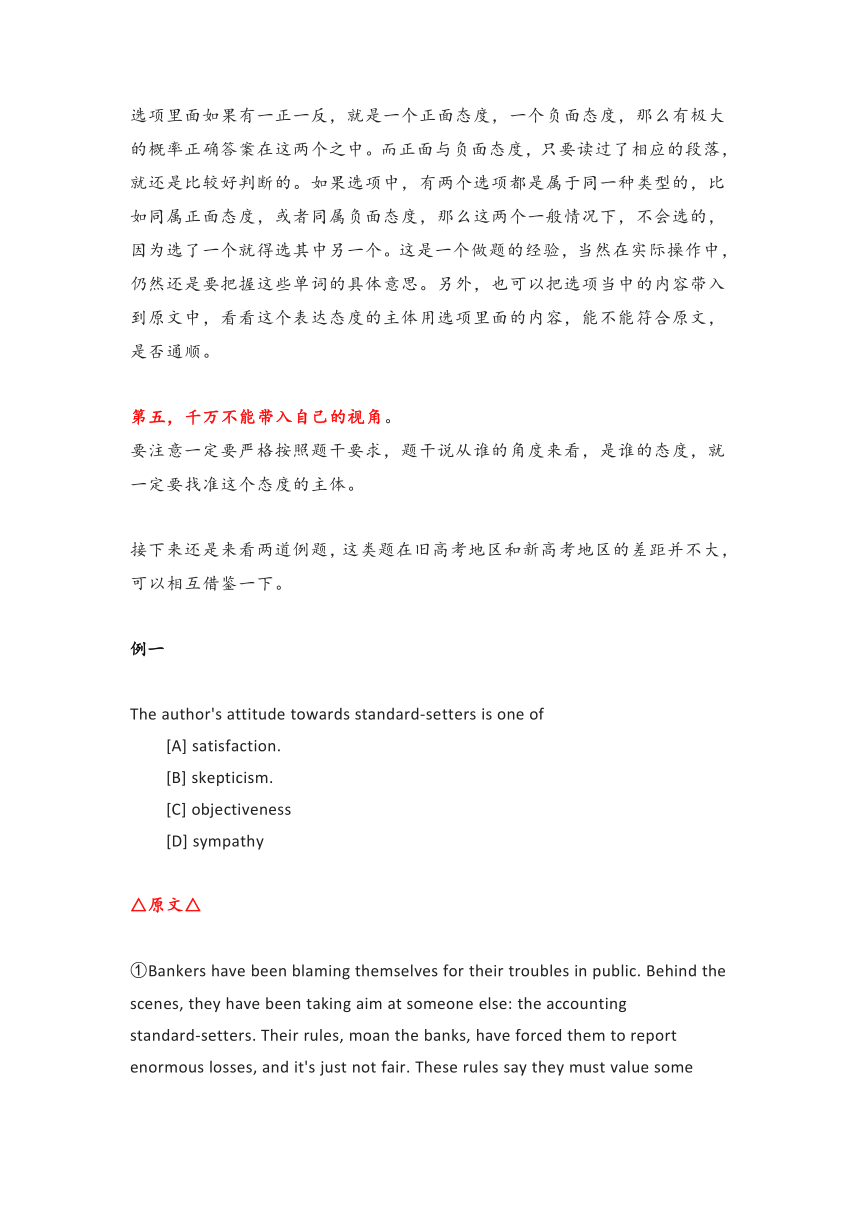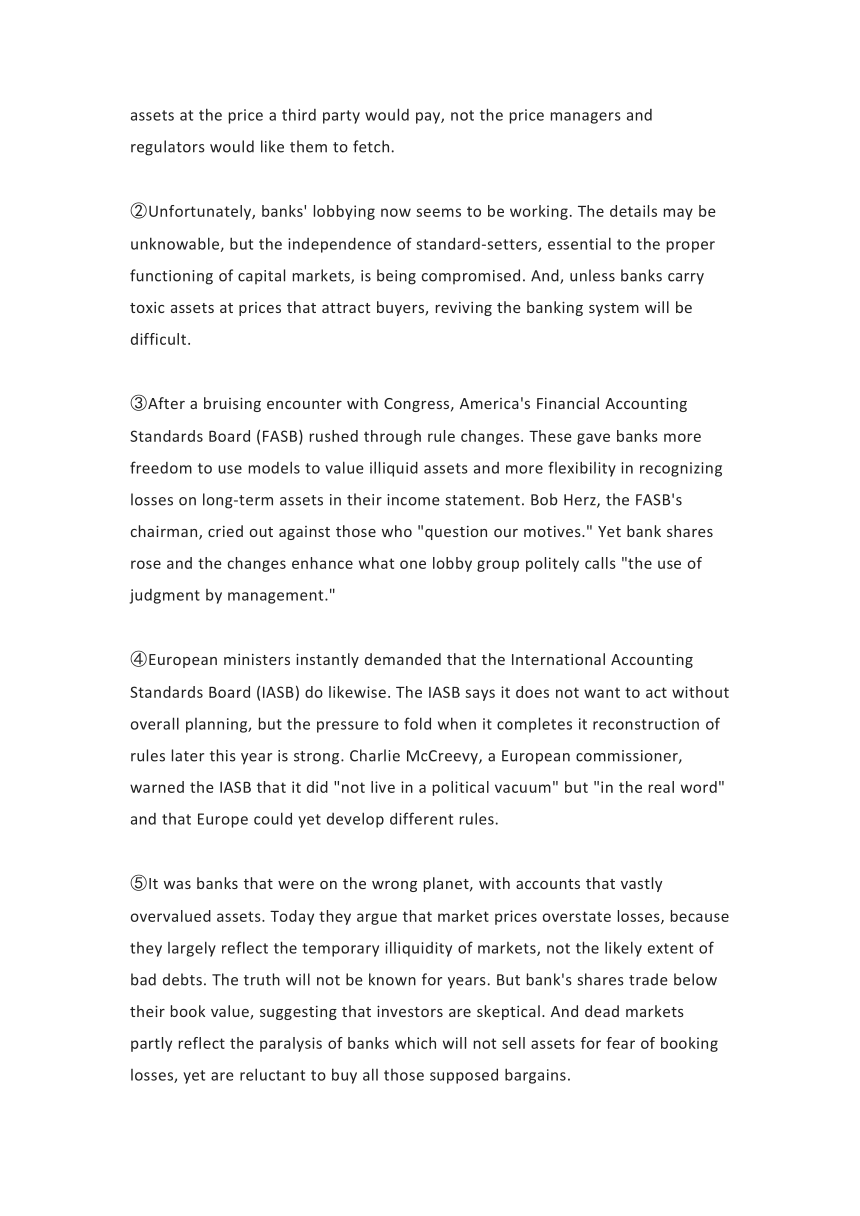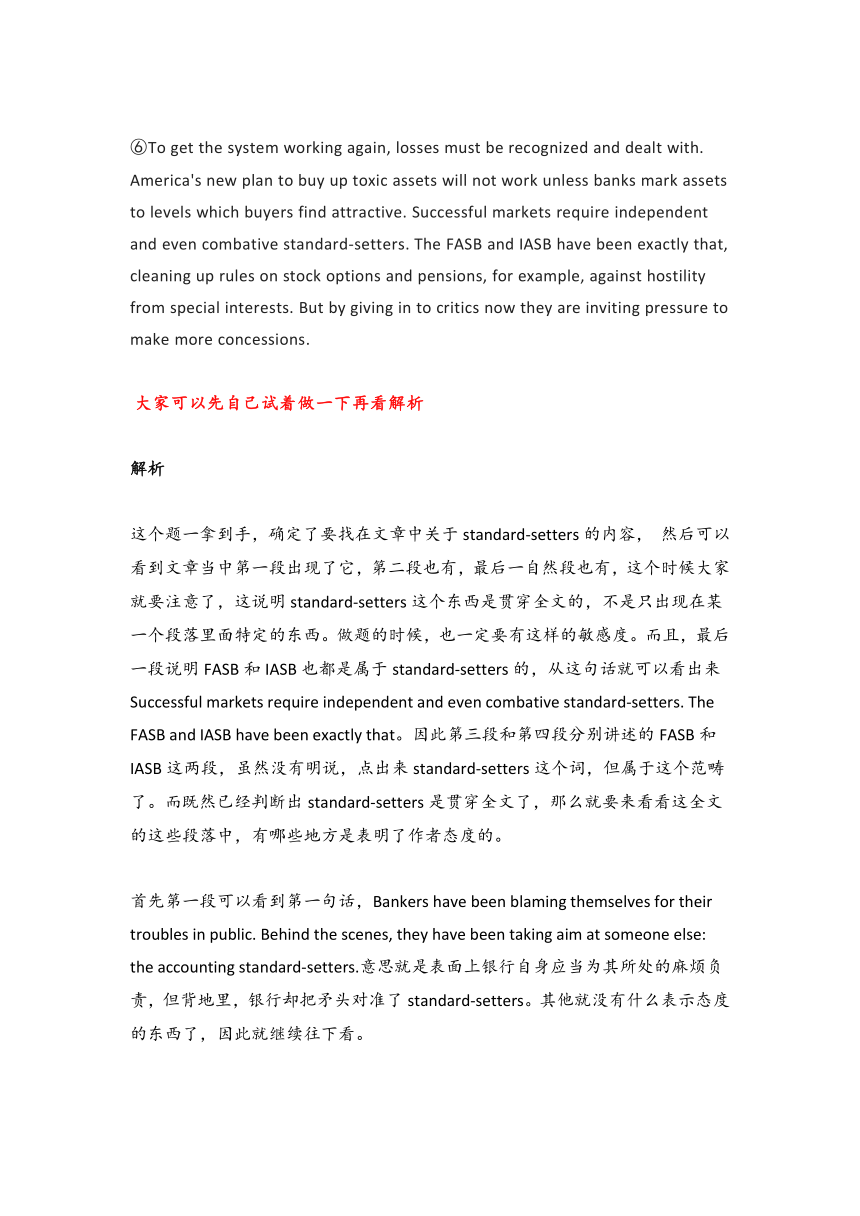2023届高考英语阅读理解技法讲义:作者态度题精讲学案(有答案)
文档属性
| 名称 | 2023届高考英语阅读理解技法讲义:作者态度题精讲学案(有答案) |  | |
| 格式 | docx | ||
| 文件大小 | 31.3KB | ||
| 资源类型 | 教案 | ||
| 版本资源 | 通用版 | ||
| 科目 | 英语 | ||
| 更新时间 | 2023-02-08 15:23:25 | ||
图片预览





文档简介
2023届高考英语阅读技法讲义:作者态度题精讲
题型概览
关于作者态度题,可以这么说,无论是旧高考地区还是新高考地区,基本上每场考试的阅读里就会出现一道题。在难度上,虽然这类题同样没有文章大意题难,但仍然不可小觑,观点态度题是属于那种上限比较高,下限也比较低的类型,做错的同学也并不在少数。因此,这类题无论是从出题频率上还是难度上,同学们也需要着重留意。
出题形式
The author's attitude towards standard-setters is one of______
Regarding Gilbert's role in revitalizing the Philharmonic, the author feels
The author suggests in the last paragraph that the effect of peer pressure is
John Donahue’s attitude towards the public-sector system is one of
The author's attitude towards what Brendon Lynch said in his blog is one of:
According to Paragraph 1, what is the author’s attitude toward the AAAS’s report
Regarding the future of the EU, the author seems to feel __ __.
……
可以看到,这一类的题,都是针对某一个事物,然后相关的人,可以是作者,也可以是文章中其他的人,来根据这个事物发表观点。
解题策略
第一,要掌握单词。尤其是表示态度的单词。
这一类题的选项,没有别的花里胡哨的东西,就是表示态度的单词,如果不认识,就没法做,只能蒙。因此,认识这些表示态度的单词,是做这类题的前提。很多同学可能看到这就会觉得,看到单词两个字就很头痛,其实这是语言的共性,换个角度想,单词就好比汉字,做英文阅读理解的时候不认识单词,就像做语文的阅读理解的时候,不认识汉字一样,不认识就是没法做题,这是一个道理。退一万步讲,选项里面的四个单词至少也要认识3个才行,这样也可以根据排除法将正确答案选出来。
第二,要注意英文里面一些词语的褒贬含义。
英语和汉语一样,有的词也是暗含了褒贬色彩的。中文里面脑袋瓜好使,如果表扬的话, 就是聪明,如果批评的话,就是老奸巨猾。在英文中也是同样的,因此语气强烈与否,感情褒贬与否,咱们同样要注意积累这样的词汇,看到了就要注意,比如must和have to同样表示必须,但是must的语气就十分强烈,有的时候还能表示责备的含义,再比如虚拟语气里面could have done之类的,表示“本来可以做某事”,带有一种惋惜,责怪的意思。因此背单词的时候,词义辨析也是很有必要看的。
第三,根据题干给出的线索,确定是针对什么内容的态度,然后在文章当中找到相应的位置。
在阅读文章中相应部分的时候,应当着重注意表达态度的这个人的部分,理解其思想。同时,要格外注意转折现象,一旦有转折现象,那么转折之后的部分,才是重点。然后将原文之中的观点部分,与选项进行结合得出答案。
这看起来有一点像是做细节题的步骤,都是找定位,然后对比选项,但与细节题不同的是,态度题有时候没有明说具体的态度是什么,需要一定的归纳能力,能够通过表达态度的主体的话语行为以及一些表示褒贬倾向的词和句子,来推断其态度。并且,细节题出现的地方是特定的就这一处,而态度题当中,这个对象则是有可能会贯穿全文,这种情况下,还要立足于全文来理解,标记处全文中跟这个对象有关的评论,观点等话语进行分析。
第四,根据选项来进行判断。
选项里面如果有一正一反,就是一个正面态度,一个负面态度,那么有极大的概率正确答案在这两个之中。而正面与负面态度,只要读过了相应的段落,就还是比较好判断的。如果选项中,有两个选项都是属于同一种类型的,比如同属正面态度,或者同属负面态度,那么这两个一般情况下,不会选的,因为选了一个就得选其中另一个。这是一个做题的经验,当然在实际操作中,仍然还是要把握这些单词的具体意思。另外,也可以把选项当中的内容带入到原文中,看看这个表达态度的主体用选项里面的内容,能不能符合原文,是否通顺。
第五,千万不能带入自己的视角。
要注意一定要严格按照题干要求,题干说从谁的角度来看,是谁的态度,就一定要找准这个态度的主体。
接下来还是来看两道例题,这类题在旧高考地区和新高考地区的差距并不大,可以相互借鉴一下。
例一
The author's attitude towards standard-setters is one of
[A] satisfaction.
[B] skepticism.
[C] objectiveness
[D] sympathy
△原文△
①Bankers have been blaming themselves for their troubles in public. Behind the scenes, they have been taking aim at someone else: the accounting standard-setters. Their rules, moan the banks, have forced them to report enormous losses, and it's just not fair. These rules say they must value some assets at the price a third party would pay, not the price managers and regulators would like them to fetch.
②Unfortunately, banks' lobbying now seems to be working. The details may be unknowable, but the independence of standard-setters, essential to the proper functioning of capital markets, is being compromised. And, unless banks carry toxic assets at prices that attract buyers, reviving the banking system will be difficult.
③After a bruising encounter with Congress, America's Financial Accounting Standards Board (FASB) rushed through rule changes. These gave banks more freedom to use models to value illiquid assets and more flexibility in recognizing losses on long-term assets in their income statement. Bob Herz, the FASB's chairman, cried out against those who "question our motives." Yet bank shares rose and the changes enhance what one lobby group politely calls "the use of judgment by management."
④European ministers instantly demanded that the International Accounting Standards Board (IASB) do likewise. The IASB says it does not want to act without overall planning, but the pressure to fold when it completes it reconstruction of rules later this year is strong. Charlie McCreevy, a European commissioner, warned the IASB that it did "not live in a political vacuum" but "in the real word" and that Europe could yet develop different rules.
⑤It was banks that were on the wrong planet, with accounts that vastly overvalued assets. Today they argue that market prices overstate losses, because they largely reflect the temporary illiquidity of markets, not the likely extent of bad debts. The truth will not be known for years. But bank's shares trade below their book value, suggesting that investors are skeptical. And dead markets partly reflect the paralysis of banks which will not sell assets for fear of booking losses, yet are reluctant to buy all those supposed bargains.
⑥To get the system working again, losses must be recognized and dealt with. America's new plan to buy up toxic assets will not work unless banks mark assets to levels which buyers find attractive. Successful markets require independent and even combative standard-setters. The FASB and IASB have been exactly that, cleaning up rules on stock options and pensions, for example, against hostility from special interests. But by giving in to critics now they are inviting pressure to make more concessions.
大家可以先自己试着做一下再看解析
解析
这个题一拿到手,确定了要找在文章中关于standard-setters的内容, 然后可以看到文章当中第一段出现了它,第二段也有,最后一自然段也有,这个时候大家就要注意了,这说明standard-setters这个东西是贯穿全文的,不是只出现在某一个段落里面特定的东西。做题的时候,也一定要有这样的敏感度。而且,最后一段说明FASB和IASB也都是属于standard-setters的,从这句话就可以看出来Successful markets require independent and even combative standard-setters. The FASB and IASB have been exactly that。因此第三段和第四段分别讲述的FASB和IASB这两段,虽然没有明说,点出来standard-setters这个词,但属于这个范畴了。而既然已经判断出standard-setters是贯穿全文了,那么就要来看看这全文的这些段落中,有哪些地方是表明了作者态度的。
首先第一段可以看到第一句话,Bankers have been blaming themselves for their troubles in public. Behind the scenes, they have been taking aim at someone else: the accounting standard-setters.意思就是表面上银行自身应当为其所处的麻烦负责,但背地里,银行却把矛头对准了standard-setters。其他就没有什么表示态度的东西了,因此就继续往下看。
第二段Unfortunately, banks' lobbying now seems to be working. The details may be unknowable, but the independence of standard-setters, essential to the proper functioning of capital markets, is being compromised.这句话中 unfortunately和compromised表明了银行在不断游说,而standard-setters却妥协了,并且是在保证市场运行最重要的独立性上妥协了。这说明后者遇到了阻力与困难。
第三段Bob Herz, the FASB's chairman, cried out against those who "question our motives."这里说明cried out against 表示强烈反对,cry out的意思是大声呼喊,更接地气的说法是扯破喉咙了,这画面大家想象一下。这说明FASB遇到的阻力还是挺大的。
第四段The IASB says it does not want to act without overall planning, but the pressure to fold when it completes it reconstruction of rules later this year is strong.这句话也有感彩,IASB说它不像在没有总体计划的时候就行动,但是面临的压力却是巨大的。同样说明阻力挺大。
第五段It was banks that were on the wrong planet,这话就是作者表明态度了,表明过错根本就是在银行的这一方。也就是说,错误根本就不在standard-setters。
最后一段Successful markets require independent and even combative standard-setters. The FASB and IASB have been exactly that, cleaning up rules on stock options and pensions, for example, against hostility from special interests. But by giving in to critics now they are inviting pressure to make more concessions.
表明成熟的市场需要独立的standard-setters,这里有的同学不认识combative,但是没有关系,因为and链接的是连个并列的成分,认识independent就可以了,后面的意思也是和independent一样表示正面倾向的词。接着FASB和IASB 用的词叫exactly that,正是那样。这说明作者对于standard-setters是支持的,或者说是看好的。不过后面紧接着又来了一个转折。但他们也屈服于这些批评,招来了更多的压力和让步。
这一整套看下来,可以看到,作者是站在standard-setters这一方的,但是也指出来他们也遇到了很多阻力。所以接下来可以看选项
A选项中,satisfaction表示满意,这都屈服于压力了,很明显达不到满意的标准。所以很容易就排除了。
B选项,skepticism, 怀疑。但是作者并没有对standard-setters表示怀疑。很多同学可能以为作者说了他们屈服于压力批评,就会觉得作者怀疑他们的能力了。这就属于自己强行主观联系了。如果是怀疑的话,那就是怀疑整个standard-setters到底行不行,如果是这样的话,作者也不会说出一个成功的市场,需要独立且有斗志的standard-setters这样的话了。
C选项,objectiveness,客观。迷惑性挺大的一个选项,很多同学会觉得既说了好的地方,也说了阻力,那就是客观了。这同样也犯了一个误区。那就是忽略了当中的感彩。支持并不是只能说好的,不能说不好的,客观,也不是好和不好都说了就是客观了。要客观中立描述,还需要不掺入作者自身的感情。可是作者在文中是有情感偏向的。第二段的unfortunately,就是作者情感表露的一个迹象,银行的游说快成功了,standard-setters遇到困难了。如果是中立客观的话,那么只会陈述这样一个事实,而不会加上这样unfortunately这样的词,表示非常不幸,大家可以自己想想,什么情况下,才会说非常不幸,别人遇到了倒霉的事情,而自己表示同情的时候,会说感到不幸。而这,并不是中立客观。并且,除此之外,大家同样也可以结合第五段整段都在说是银行方面的过错,以及第六段作者对于standard-setters的肯定。也可以得出作者是支持他们而非银行的。因为如果中立客观的话,那么怎么没有看见作者说一点银行的好话呢。
通过C选项,可以得出,要满足客观性这个条件,第一是有好有坏,不拉偏架。第二是不掺杂个人感情。这两点文章都没有满足。虽然文章说了standard-setters的好与难处,但是对银行却全是否定。并且,整篇文章的立场也是支持standard-setters的。
所以C选项,虽然有迷惑性,但仍然不选。
D选项,同情。在这里的同情,并不是看到别人发生了不幸就流眼泪心酸的那种同情,sympathy这个词,更接近于“同理心”,表示能够站在别人的立场设身处地的想问题。就相当于“理解,支持”。鉴于sympathy或者是sympathetic这样的词在高考的态度题经常出现,大家也一定要辨认清楚,这个词在这就是表示“支持”的意思。
正确答案:D
例二
The author’s attitude toward the influence of advertisement on people’s habits is____
[A]indifferent
[B]negative
[C]positive
[D]biased
△原文△
①over the past decade, many companies had perfected the art of creating automatic behaviors - habits - among consumers. These habits have helped companies earn billions of dollars when customers eat snacks, apply lotions and wipe counters almost without thinking, often in response to a carefully designed set of daily cues.
②“There are fundamental public health problems, like hand washing with soap, that remain killers only because we can’t figure out how to change people’s habits,” Dr. Curtis said. “We wanted to learn from private industry how to create new behaviors that happen automatically.”
③The companies that Dr. Curtis turned to - Procter & Gamble, Colgate-Palmolive and Unilever - had invested hundreds of millions of dollars finding the subtle cues in consumers’ lives that corporations could use to introduce new routines.
④If you look hard enough, you’ll find that many of the products we use every day - chewing gums, skin moisturizers, disinfecting wipes, air fresheners, water purifiers, health snacks, antiperspirants, colognes, teeth whiteners, fabric softeners, vitamins - are results of manufactured habits. A century ago, few people regularly brushed their teeth multiple times a day. Today, because of canny advertising and public health campaigns, many Americans habitually give their pearly whites a cavity-preventing scrub twice a day, often with Colgate, Crest or one of the other brands.
⑤A few decades ago, many people didn’t drink water outside of a meal. Then beverage companies started bottling the production of far-off springs,and now office workers unthinkingly sip bottled water all day long. Chewing gum, once bought primarily by adolescent boys, is now featured in commercials as a breath freshener and teeth cleanser for use after a meal. Skin moisturizers are advertised as part of morning beauty rituals,slipped in between hair brushing and putting on makeup.
⑥“Our products succeed when they become part of daily or weekly patterns,” said Carol Berning, a consumer psychologist who recently retired from Procter & Gamble, the company that sold $76 billion of Tide, Crest and other products last year. “Creating positive habits is a huge part of improving our consumers’ lives, and it’s essential to making new products commercially viable.”
⑦Through experiments and observation, social scientists like Dr. Berning have learned that there is power in tying certain behaviors to habitual cues through relentless advertising. As this new science of habit has emerged, controversies have erupted when the tactics have been used to sell questionable beauty creams or unhealthy foods.
大家可以先自己试着做一下再看解析
解析
这个题同样,要求选出“作者”对于广告影响人们生活习惯这个事情的态度与看法。那么文章当中,讲到广告影响人的生活习惯的是哪些地方呢,可以看到这是从文章的第四段开始的,第四段的If you look hard enough, you’ll find that many of the products we use every day - chewing gums, skin moisturizers, disinfecting wipes, air fresheners, water purifiers, health snacks, antiperspirants, colognes, teeth whiteners, fabric softeners, vitamins - are results of manufactured habits.这句话表明人的习惯也是可以被塑造的。但是第四段只是在陈述一个事实,暂时还没有看到作者对此的评论和情感的表露。所以我们可以接着往下看。第五段也同样如此,没有掺杂情感和评论,只是单纯的评论事实,如果单独看这两段的话,可以算作是客观了。大家可以自行体会一下,是不是符合了就事论事描述事实,并且没有个人情感在其中的原则。而在第六七自然段,也就是文章的最后两段,就有议论出来了。第六段引用了一个教授的话说,塑造积极的习惯是提高消费者生活的一个很重要的部分。最后一段则是也提到了这也伴随着争议,尤其是有人会利用这些习惯来销售质量有问题的化妆品和不健康的食物。
文章梳理出来了,有议论的地方在文章的最后两个自然段。
那么就可以直接看选项。
A选项indifferent,冷漠的,漠不关心的,如果这篇文章只在第四段或者第五段结尾的话,这个选项还是可以选的,但是最后一段关于争议的描述,很明显是作者自己的观点,作者自己下场评论了,所以indifferent就不能选了。
B选项negative,负面的。那么我们看看作者是怎么说的,最后一段中As this new science of habit has emerged, controversies have erupted when the tactics have been used to sell questionable beauty creams or unhealthy foods.
这句话表明作者认为这种通过商业推广塑造人们习惯还是会带来争议的,尤其是会被那些劣质产品视频利用的话。这个争议肯定不是个好的,正面的东西,所以作者的态度也是不太好的,那么negative没有什么问题。
C选项positive,这个就很离谱,与B选项相反,文章最后也说了,作者认为这会引起争议,那肯定就跟积极的,正面的,没有任何关系了。而且第六段虽然提到了塑造积极的习惯能够有助于提高生活之类的话,但是我们要看清楚,说这话的是谁,是一个教授的观点,而不是作者本人的观点,作者本人的评论在最后一段。我们不能把主题搞错了。所以这个选项可以叉掉了。
D选项biased,有偏见的,片面的。这个选项如果选的话,就不太合适。作者还是尽可能的比较全面了,引用那个教授的表明塑造习惯是有积极的作用,但是自己仍然关注的是有争议的部分。这能叫片面的,有偏见的吗?这不能,全面倒是还可以。
正确答案:B
总结
以上两个例题可以说是这一类题中比较难的了,一些简单的比如考察对某一个具体部分的态度在理解上就更容易了,因此这里就不再赘述了。但是通过这两道题我们可以看到,这类题单词仍然是基础,除了要认识表明态度的单词以外,还有文章当中的语气词也要格外留意,这就要求大家平时背单词的时候也要留意词意辨析这些平时可能不会注意到的地方。
而在读题的时候,也要格外注意,表达的对象到底是属于贯穿全文的,还是只存在于文中的某一部分。
如果是贯穿全文的对象,那么就需要立足于整篇文章把握,梳理每一个相关内容中与观点有联系的内容。
如果只是特定存在于某一个部分的内容,那么直接注重那一部分的内容就好,另外要注意转折关系。
题型概览
关于作者态度题,可以这么说,无论是旧高考地区还是新高考地区,基本上每场考试的阅读里就会出现一道题。在难度上,虽然这类题同样没有文章大意题难,但仍然不可小觑,观点态度题是属于那种上限比较高,下限也比较低的类型,做错的同学也并不在少数。因此,这类题无论是从出题频率上还是难度上,同学们也需要着重留意。
出题形式
The author's attitude towards standard-setters is one of______
Regarding Gilbert's role in revitalizing the Philharmonic, the author feels
The author suggests in the last paragraph that the effect of peer pressure is
John Donahue’s attitude towards the public-sector system is one of
The author's attitude towards what Brendon Lynch said in his blog is one of:
According to Paragraph 1, what is the author’s attitude toward the AAAS’s report
Regarding the future of the EU, the author seems to feel __ __.
……
可以看到,这一类的题,都是针对某一个事物,然后相关的人,可以是作者,也可以是文章中其他的人,来根据这个事物发表观点。
解题策略
第一,要掌握单词。尤其是表示态度的单词。
这一类题的选项,没有别的花里胡哨的东西,就是表示态度的单词,如果不认识,就没法做,只能蒙。因此,认识这些表示态度的单词,是做这类题的前提。很多同学可能看到这就会觉得,看到单词两个字就很头痛,其实这是语言的共性,换个角度想,单词就好比汉字,做英文阅读理解的时候不认识单词,就像做语文的阅读理解的时候,不认识汉字一样,不认识就是没法做题,这是一个道理。退一万步讲,选项里面的四个单词至少也要认识3个才行,这样也可以根据排除法将正确答案选出来。
第二,要注意英文里面一些词语的褒贬含义。
英语和汉语一样,有的词也是暗含了褒贬色彩的。中文里面脑袋瓜好使,如果表扬的话, 就是聪明,如果批评的话,就是老奸巨猾。在英文中也是同样的,因此语气强烈与否,感情褒贬与否,咱们同样要注意积累这样的词汇,看到了就要注意,比如must和have to同样表示必须,但是must的语气就十分强烈,有的时候还能表示责备的含义,再比如虚拟语气里面could have done之类的,表示“本来可以做某事”,带有一种惋惜,责怪的意思。因此背单词的时候,词义辨析也是很有必要看的。
第三,根据题干给出的线索,确定是针对什么内容的态度,然后在文章当中找到相应的位置。
在阅读文章中相应部分的时候,应当着重注意表达态度的这个人的部分,理解其思想。同时,要格外注意转折现象,一旦有转折现象,那么转折之后的部分,才是重点。然后将原文之中的观点部分,与选项进行结合得出答案。
这看起来有一点像是做细节题的步骤,都是找定位,然后对比选项,但与细节题不同的是,态度题有时候没有明说具体的态度是什么,需要一定的归纳能力,能够通过表达态度的主体的话语行为以及一些表示褒贬倾向的词和句子,来推断其态度。并且,细节题出现的地方是特定的就这一处,而态度题当中,这个对象则是有可能会贯穿全文,这种情况下,还要立足于全文来理解,标记处全文中跟这个对象有关的评论,观点等话语进行分析。
第四,根据选项来进行判断。
选项里面如果有一正一反,就是一个正面态度,一个负面态度,那么有极大的概率正确答案在这两个之中。而正面与负面态度,只要读过了相应的段落,就还是比较好判断的。如果选项中,有两个选项都是属于同一种类型的,比如同属正面态度,或者同属负面态度,那么这两个一般情况下,不会选的,因为选了一个就得选其中另一个。这是一个做题的经验,当然在实际操作中,仍然还是要把握这些单词的具体意思。另外,也可以把选项当中的内容带入到原文中,看看这个表达态度的主体用选项里面的内容,能不能符合原文,是否通顺。
第五,千万不能带入自己的视角。
要注意一定要严格按照题干要求,题干说从谁的角度来看,是谁的态度,就一定要找准这个态度的主体。
接下来还是来看两道例题,这类题在旧高考地区和新高考地区的差距并不大,可以相互借鉴一下。
例一
The author's attitude towards standard-setters is one of
[A] satisfaction.
[B] skepticism.
[C] objectiveness
[D] sympathy
△原文△
①Bankers have been blaming themselves for their troubles in public. Behind the scenes, they have been taking aim at someone else: the accounting standard-setters. Their rules, moan the banks, have forced them to report enormous losses, and it's just not fair. These rules say they must value some assets at the price a third party would pay, not the price managers and regulators would like them to fetch.
②Unfortunately, banks' lobbying now seems to be working. The details may be unknowable, but the independence of standard-setters, essential to the proper functioning of capital markets, is being compromised. And, unless banks carry toxic assets at prices that attract buyers, reviving the banking system will be difficult.
③After a bruising encounter with Congress, America's Financial Accounting Standards Board (FASB) rushed through rule changes. These gave banks more freedom to use models to value illiquid assets and more flexibility in recognizing losses on long-term assets in their income statement. Bob Herz, the FASB's chairman, cried out against those who "question our motives." Yet bank shares rose and the changes enhance what one lobby group politely calls "the use of judgment by management."
④European ministers instantly demanded that the International Accounting Standards Board (IASB) do likewise. The IASB says it does not want to act without overall planning, but the pressure to fold when it completes it reconstruction of rules later this year is strong. Charlie McCreevy, a European commissioner, warned the IASB that it did "not live in a political vacuum" but "in the real word" and that Europe could yet develop different rules.
⑤It was banks that were on the wrong planet, with accounts that vastly overvalued assets. Today they argue that market prices overstate losses, because they largely reflect the temporary illiquidity of markets, not the likely extent of bad debts. The truth will not be known for years. But bank's shares trade below their book value, suggesting that investors are skeptical. And dead markets partly reflect the paralysis of banks which will not sell assets for fear of booking losses, yet are reluctant to buy all those supposed bargains.
⑥To get the system working again, losses must be recognized and dealt with. America's new plan to buy up toxic assets will not work unless banks mark assets to levels which buyers find attractive. Successful markets require independent and even combative standard-setters. The FASB and IASB have been exactly that, cleaning up rules on stock options and pensions, for example, against hostility from special interests. But by giving in to critics now they are inviting pressure to make more concessions.
大家可以先自己试着做一下再看解析
解析
这个题一拿到手,确定了要找在文章中关于standard-setters的内容, 然后可以看到文章当中第一段出现了它,第二段也有,最后一自然段也有,这个时候大家就要注意了,这说明standard-setters这个东西是贯穿全文的,不是只出现在某一个段落里面特定的东西。做题的时候,也一定要有这样的敏感度。而且,最后一段说明FASB和IASB也都是属于standard-setters的,从这句话就可以看出来Successful markets require independent and even combative standard-setters. The FASB and IASB have been exactly that。因此第三段和第四段分别讲述的FASB和IASB这两段,虽然没有明说,点出来standard-setters这个词,但属于这个范畴了。而既然已经判断出standard-setters是贯穿全文了,那么就要来看看这全文的这些段落中,有哪些地方是表明了作者态度的。
首先第一段可以看到第一句话,Bankers have been blaming themselves for their troubles in public. Behind the scenes, they have been taking aim at someone else: the accounting standard-setters.意思就是表面上银行自身应当为其所处的麻烦负责,但背地里,银行却把矛头对准了standard-setters。其他就没有什么表示态度的东西了,因此就继续往下看。
第二段Unfortunately, banks' lobbying now seems to be working. The details may be unknowable, but the independence of standard-setters, essential to the proper functioning of capital markets, is being compromised.这句话中 unfortunately和compromised表明了银行在不断游说,而standard-setters却妥协了,并且是在保证市场运行最重要的独立性上妥协了。这说明后者遇到了阻力与困难。
第三段Bob Herz, the FASB's chairman, cried out against those who "question our motives."这里说明cried out against 表示强烈反对,cry out的意思是大声呼喊,更接地气的说法是扯破喉咙了,这画面大家想象一下。这说明FASB遇到的阻力还是挺大的。
第四段The IASB says it does not want to act without overall planning, but the pressure to fold when it completes it reconstruction of rules later this year is strong.这句话也有感彩,IASB说它不像在没有总体计划的时候就行动,但是面临的压力却是巨大的。同样说明阻力挺大。
第五段It was banks that were on the wrong planet,这话就是作者表明态度了,表明过错根本就是在银行的这一方。也就是说,错误根本就不在standard-setters。
最后一段Successful markets require independent and even combative standard-setters. The FASB and IASB have been exactly that, cleaning up rules on stock options and pensions, for example, against hostility from special interests. But by giving in to critics now they are inviting pressure to make more concessions.
表明成熟的市场需要独立的standard-setters,这里有的同学不认识combative,但是没有关系,因为and链接的是连个并列的成分,认识independent就可以了,后面的意思也是和independent一样表示正面倾向的词。接着FASB和IASB 用的词叫exactly that,正是那样。这说明作者对于standard-setters是支持的,或者说是看好的。不过后面紧接着又来了一个转折。但他们也屈服于这些批评,招来了更多的压力和让步。
这一整套看下来,可以看到,作者是站在standard-setters这一方的,但是也指出来他们也遇到了很多阻力。所以接下来可以看选项
A选项中,satisfaction表示满意,这都屈服于压力了,很明显达不到满意的标准。所以很容易就排除了。
B选项,skepticism, 怀疑。但是作者并没有对standard-setters表示怀疑。很多同学可能以为作者说了他们屈服于压力批评,就会觉得作者怀疑他们的能力了。这就属于自己强行主观联系了。如果是怀疑的话,那就是怀疑整个standard-setters到底行不行,如果是这样的话,作者也不会说出一个成功的市场,需要独立且有斗志的standard-setters这样的话了。
C选项,objectiveness,客观。迷惑性挺大的一个选项,很多同学会觉得既说了好的地方,也说了阻力,那就是客观了。这同样也犯了一个误区。那就是忽略了当中的感彩。支持并不是只能说好的,不能说不好的,客观,也不是好和不好都说了就是客观了。要客观中立描述,还需要不掺入作者自身的感情。可是作者在文中是有情感偏向的。第二段的unfortunately,就是作者情感表露的一个迹象,银行的游说快成功了,standard-setters遇到困难了。如果是中立客观的话,那么只会陈述这样一个事实,而不会加上这样unfortunately这样的词,表示非常不幸,大家可以自己想想,什么情况下,才会说非常不幸,别人遇到了倒霉的事情,而自己表示同情的时候,会说感到不幸。而这,并不是中立客观。并且,除此之外,大家同样也可以结合第五段整段都在说是银行方面的过错,以及第六段作者对于standard-setters的肯定。也可以得出作者是支持他们而非银行的。因为如果中立客观的话,那么怎么没有看见作者说一点银行的好话呢。
通过C选项,可以得出,要满足客观性这个条件,第一是有好有坏,不拉偏架。第二是不掺杂个人感情。这两点文章都没有满足。虽然文章说了standard-setters的好与难处,但是对银行却全是否定。并且,整篇文章的立场也是支持standard-setters的。
所以C选项,虽然有迷惑性,但仍然不选。
D选项,同情。在这里的同情,并不是看到别人发生了不幸就流眼泪心酸的那种同情,sympathy这个词,更接近于“同理心”,表示能够站在别人的立场设身处地的想问题。就相当于“理解,支持”。鉴于sympathy或者是sympathetic这样的词在高考的态度题经常出现,大家也一定要辨认清楚,这个词在这就是表示“支持”的意思。
正确答案:D
例二
The author’s attitude toward the influence of advertisement on people’s habits is____
[A]indifferent
[B]negative
[C]positive
[D]biased
△原文△
①over the past decade, many companies had perfected the art of creating automatic behaviors - habits - among consumers. These habits have helped companies earn billions of dollars when customers eat snacks, apply lotions and wipe counters almost without thinking, often in response to a carefully designed set of daily cues.
②“There are fundamental public health problems, like hand washing with soap, that remain killers only because we can’t figure out how to change people’s habits,” Dr. Curtis said. “We wanted to learn from private industry how to create new behaviors that happen automatically.”
③The companies that Dr. Curtis turned to - Procter & Gamble, Colgate-Palmolive and Unilever - had invested hundreds of millions of dollars finding the subtle cues in consumers’ lives that corporations could use to introduce new routines.
④If you look hard enough, you’ll find that many of the products we use every day - chewing gums, skin moisturizers, disinfecting wipes, air fresheners, water purifiers, health snacks, antiperspirants, colognes, teeth whiteners, fabric softeners, vitamins - are results of manufactured habits. A century ago, few people regularly brushed their teeth multiple times a day. Today, because of canny advertising and public health campaigns, many Americans habitually give their pearly whites a cavity-preventing scrub twice a day, often with Colgate, Crest or one of the other brands.
⑤A few decades ago, many people didn’t drink water outside of a meal. Then beverage companies started bottling the production of far-off springs,and now office workers unthinkingly sip bottled water all day long. Chewing gum, once bought primarily by adolescent boys, is now featured in commercials as a breath freshener and teeth cleanser for use after a meal. Skin moisturizers are advertised as part of morning beauty rituals,slipped in between hair brushing and putting on makeup.
⑥“Our products succeed when they become part of daily or weekly patterns,” said Carol Berning, a consumer psychologist who recently retired from Procter & Gamble, the company that sold $76 billion of Tide, Crest and other products last year. “Creating positive habits is a huge part of improving our consumers’ lives, and it’s essential to making new products commercially viable.”
⑦Through experiments and observation, social scientists like Dr. Berning have learned that there is power in tying certain behaviors to habitual cues through relentless advertising. As this new science of habit has emerged, controversies have erupted when the tactics have been used to sell questionable beauty creams or unhealthy foods.
大家可以先自己试着做一下再看解析
解析
这个题同样,要求选出“作者”对于广告影响人们生活习惯这个事情的态度与看法。那么文章当中,讲到广告影响人的生活习惯的是哪些地方呢,可以看到这是从文章的第四段开始的,第四段的If you look hard enough, you’ll find that many of the products we use every day - chewing gums, skin moisturizers, disinfecting wipes, air fresheners, water purifiers, health snacks, antiperspirants, colognes, teeth whiteners, fabric softeners, vitamins - are results of manufactured habits.这句话表明人的习惯也是可以被塑造的。但是第四段只是在陈述一个事实,暂时还没有看到作者对此的评论和情感的表露。所以我们可以接着往下看。第五段也同样如此,没有掺杂情感和评论,只是单纯的评论事实,如果单独看这两段的话,可以算作是客观了。大家可以自行体会一下,是不是符合了就事论事描述事实,并且没有个人情感在其中的原则。而在第六七自然段,也就是文章的最后两段,就有议论出来了。第六段引用了一个教授的话说,塑造积极的习惯是提高消费者生活的一个很重要的部分。最后一段则是也提到了这也伴随着争议,尤其是有人会利用这些习惯来销售质量有问题的化妆品和不健康的食物。
文章梳理出来了,有议论的地方在文章的最后两个自然段。
那么就可以直接看选项。
A选项indifferent,冷漠的,漠不关心的,如果这篇文章只在第四段或者第五段结尾的话,这个选项还是可以选的,但是最后一段关于争议的描述,很明显是作者自己的观点,作者自己下场评论了,所以indifferent就不能选了。
B选项negative,负面的。那么我们看看作者是怎么说的,最后一段中As this new science of habit has emerged, controversies have erupted when the tactics have been used to sell questionable beauty creams or unhealthy foods.
这句话表明作者认为这种通过商业推广塑造人们习惯还是会带来争议的,尤其是会被那些劣质产品视频利用的话。这个争议肯定不是个好的,正面的东西,所以作者的态度也是不太好的,那么negative没有什么问题。
C选项positive,这个就很离谱,与B选项相反,文章最后也说了,作者认为这会引起争议,那肯定就跟积极的,正面的,没有任何关系了。而且第六段虽然提到了塑造积极的习惯能够有助于提高生活之类的话,但是我们要看清楚,说这话的是谁,是一个教授的观点,而不是作者本人的观点,作者本人的评论在最后一段。我们不能把主题搞错了。所以这个选项可以叉掉了。
D选项biased,有偏见的,片面的。这个选项如果选的话,就不太合适。作者还是尽可能的比较全面了,引用那个教授的表明塑造习惯是有积极的作用,但是自己仍然关注的是有争议的部分。这能叫片面的,有偏见的吗?这不能,全面倒是还可以。
正确答案:B
总结
以上两个例题可以说是这一类题中比较难的了,一些简单的比如考察对某一个具体部分的态度在理解上就更容易了,因此这里就不再赘述了。但是通过这两道题我们可以看到,这类题单词仍然是基础,除了要认识表明态度的单词以外,还有文章当中的语气词也要格外留意,这就要求大家平时背单词的时候也要留意词意辨析这些平时可能不会注意到的地方。
而在读题的时候,也要格外注意,表达的对象到底是属于贯穿全文的,还是只存在于文中的某一部分。
如果是贯穿全文的对象,那么就需要立足于整篇文章把握,梳理每一个相关内容中与观点有联系的内容。
如果只是特定存在于某一个部分的内容,那么直接注重那一部分的内容就好,另外要注意转折关系。
